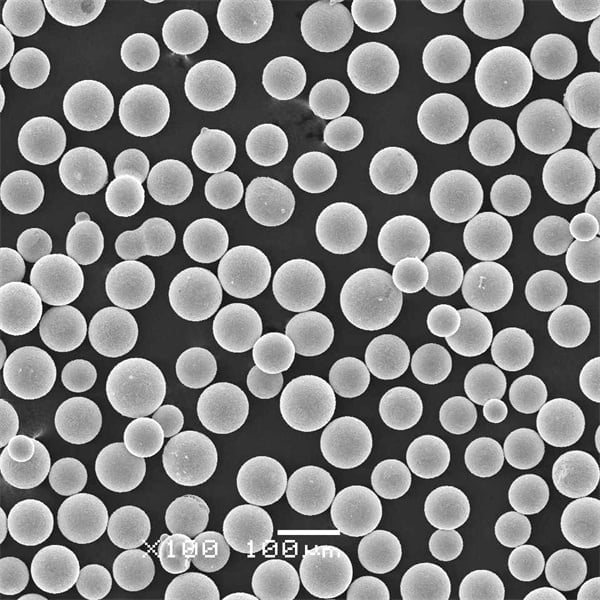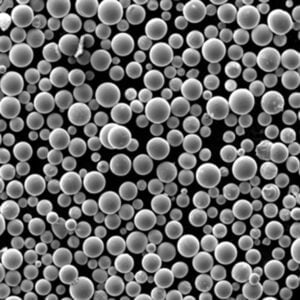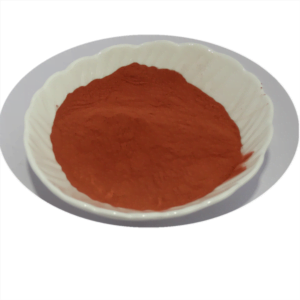Gas Atomized Titanium Powder
Table of Contents
Gas atomized titanium powder is a high purity titanium powder produced through gas atomization, a process where molten titanium is hit with high pressure gas streams to produce fine titanium particles. This powder has unique properties that make it suitable for various applications across industries.
Overview of Gas Atomized Titanium Powder
Gas atomized titanium powder has the following key characteristics:
Composition
| Main component | Titanium (Ti) |
| Common alloys | Ti-6Al-4V, Ti-6Al-4V ELI |
| Trace elements | Oxygen, nitrogen, hydrogen, iron |
Properties
| Particle shape | Spherical |
| Particle size | 15 – 150 microns |
| Flowability | Excellent due to spherical shape |
| Apparent density | 2.7 – 3.5 g/cc |
| Tap density | 3.5 – 4.5 g/cc |
Manufacturing Process
- Raw titanium ingots are melted using plasma arc melting
- High pressure inert gas (usually argon or nitrogen) is used to atomize the molten titanium
- Fine spherical powder particles solidify rapidly in the atomization tower
- Powder is collected and sieved into appropriate particle size ranges
Quality Standards
- ASTM B849
- AMS 4992
- ISO 22068
Common Trade Names
- Ti64 ELI Grade 23
- Plasma Atomized Ti-6Al-4V Grade 5
Cost
| Particle Size | Price per kg |
|---|---|
| 15-45 microns | $50-$100 |
| 45-105 microns | $30-$60 |
| 105-150 microns | $20-$40 |

Applications of Gas Atomized Titanium Powder
Gas atomized titanium sees use across industries owing to its unique properties. Some major applications include:
Additive Manufacturing
- Selective laser melting (SLM)
- Electron beam melting (EBM)
- Binder jetting
Used to produce complex titanium components for aerospace, medical, and automotive parts.
Metal Injection Molding
- Small complex parts like fasteners, gears
- High mechanical strength
- Net-shape or near-net shape parts
Thermal Spray Coatings
- Corrosion and wear-resistant coatings
- Hardface coatings up to 550 HV
Powder Metallurgy
- Sintered parts like golf club heads, bicycle parts
- Porous structures for filters, implants
Pyrotechnics
- Bright burning titanium sparks
- Military, entertainment, other applications
Suppliers of Gas Atomized Titanium Powder
Most major titanium producers and metal powder manufacturers supply gas atomized titanium powder. Some leading global suppliers include:
| Supplier | Location |
|---|---|
| AP&C | Canada |
| ATI Powder Metals | USA |
| Carpenter Technology | USA |
| Hoganas | Sweden |
| GfE Metalle und Materialien | Germany |
| TLS Technik | Germany |
Pricing
Gas atomized titanium powder is more expensive than other forms of titanium powder owing to the complex manufacturing process. Prices range from $20 per kg for larger size fractions to $100 per kg for the finest medical grade powders. Minimum order quantities are usually around 25-100 kg.
Pros and Cons of Gas Atomized Titanium Powder
Advantages
- Spherical morphology gives excellent flowability
- High purity, alloyed grades available
- Controlled particle size distribution
- Used in advanced applications like additive manufacturing
Disadvantages
- More expensive than other titanium powder types
- Limited suppliers and production capacity globally
- Requires specialized storage and handling
Comparison to Other Titanium Powder Types
Versus Sponge Fine Titanium
- 10X higher cost
- Far superior powder properties and consistency
Versus Hydride-Dehydride Titanium
- 2X higher cost on average
- Better sphericity and flowability
- Used in more advanced applications
Versus Plasma Rotating Electrode Process Powder
- Cost is comparable
- Gas atomized has slightly better sphericity
- PREP allows larger particle sizes
Particle Size Distribution
Controlling particle size distribution is critical for gas atomized titanium powder. Some common size cuts include:
| Particle Size | Typical Applications |
|---|---|
| 15-45 microns | Additive manufacturing |
| 45-105 microns | Metal injection molding |
| 105-150 microns | Thermal spray coatings |
Laser diffraction or sieving technique is used to characterize the particle size distribution. Common statistical parameters used are:
- D10, D50, D90 (Size below which 10%, 50%, 90% particles fall)
- Span (Measure of distribution width)
ISO 13320 standard specifies procedure for analyzing size distribution using laser diffraction.
Effect of Impurities
Impurities negatively impact powder properties and must be controlled through melting and atomization process.
- Oxygen – Increases hardness and brittleness if >0.4%
- Nitrogen – Causes porosity issues > 0.05%
- Hydrogen – Causes porosity and cracking issues
- Iron – Reduces ductility and fracture resistance
Vacuum induction melting and spray forming helps achieve low oxygen and iron levels.
Storage and Handling
Special precautions needed while storing and handling titanium powder:
- Moisturesensitive – store in sealed containers with desiccant bags
- Explosion risk – inert gas blanketing required
- Pyrophoric – burns at fine particle sizes
- Requires electrically conductive containers like stainless steel
Dedicated powder storage rooms, glove boxes, and fume hoods used for handling reactive titanium powder.
Standards and Specifications
| Standard | Organization | Description |
|---|---|---|
| ASTM B849 | ASTM | Specification for pre-alloyed titanium powder |
| AMS 4992 | SAE | Specification for gas atomized titanium alloy powder |
| ISO 22068 | ISO | Specification for gas atomized titanium and titanium alloy powder |
Specifications list acceptable limits of impurity levels, particle size distribution, apparent density and other parameters. Customized customer specifications also common.
FAQs
What is gas atomization process?
Gas atomization uses high pressure inert gas jets to break up a stream of molten metal into fine droplets. These droplets rapidly solidify into spherical powder particles.
What is the benefit of spherical powder morphology?
Spherical particles have excellent flowability. This allows uniform packing and spreading needed for additive manufacturing and metal injection molding.
What are common alloys of gas atomized titanium powder?
Ti-6Al-4V, Ti-6Al-4V ELI and Ti-6Al-7Nb alloys are popular for additive manufacturing applications in aerospace and medical sectors.
What affects the cost of gas atomized titanium powder?
Purity, particle size range, shape, and sphericity determines cost. Finer medical grade powders are far more expensive than coarse industrial grade powders.
What determines suitability for specific application?
Factors like particle size range, morphology, apparent density, tap density, flow rate, impurity levels decide if the powder matches the requirements of AM, thermal spray or MIM process.
Share On
MET3DP Technology Co., LTD is a leading provider of additive manufacturing solutions headquartered in Qingdao, China. Our company specializes in 3D printing equipment and high-performance metal powders for industrial applications.
Inquiry to get best price and customized Solution for your business!
Related Articles
About Met3DP
Recent Update
Our Product
CONTACT US
Any questions? Send us message now! We’ll serve your request with a whole team after receiving your message.

Metal Powders for 3D Printing and Additive Manufacturing
COMPANY
PRODUCT
cONTACT INFO
- Qingdao City, Shandong, China
- [email protected]
- [email protected]
- +86 19116340731

















